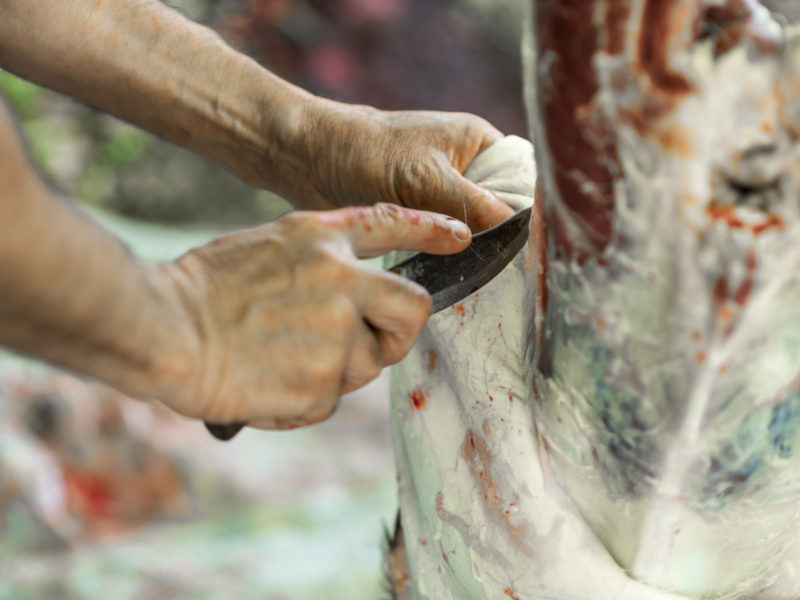PORT ALBERNI – The BC Ministry of Agriculture has announced the opening of three new regions for class D on-farm slaughter licences.
Farmers within the Regional District of Alberni-Clayoquot, as well as electoral area D in Central Kootenay and electoral area H in Fraser-Fort George Regional District, will now be eligible to apply for class D licenses.
While consumers are more attuned to the security and advantages of a local meat supply due to COVID-19, the timing is just a coincidence says BC agriculture minister Lana Popham.
“The great thing is that consumers are now asking for more food security and regional supply, and just by coincidence we were ready to make this announcement,” she says. “It looks like we responded to the concerns around the pandemic but we were going to do this anyway.”
This is the province’s second action as a result of ongoing consultations with respect to slaughter capacity. The first, in June 2019, was allowing applications for class E facilities if they were at least an hour away from a provincially inspected facility. Previously, they had to be at least two hours away.
The change followed a consultation on class D & E licences in spring 2018 as well as a report prepared by the legislature’s Select Standing Committee on Agriculture, Fish and Food that year.
“It looks like it took a long time to make these changes,” adds Popham. “But I can tell you there’s a lot more changes coming. … It’s going to address other problems within the meat system.”
That’s good news to the BC Association of Abattoirs, which sees the expansion of class D to a total of 13 regions as just a first step.
“I am happy for the producers who will be able to expand their operations with these facilities,” says association executive director Nova Woodbury. “We are supportive of on-farm slaughter. Many of the province’s inspected abattoirs started and continue as on-farm slaughter operations.”
But she says it’s important that any new class D facilities in the province have better oversight than in the past.
“We need to reassure the public that they are getting a wholesome meat product from an operator who is following humane practices at slaughter,” she says.
New operators face a steep learning curve, she says, and courses such as SlaughterSafe, a one-day course uninspected licensees must take, don’t require participants to demonstrate that they’ve learned anything. She says this could create “some potentially devastating issues for the industry.”
They will also need to obtain insurance, which Woodbury says is no small feat for an uninspected processor.
While the facilities are audited by their local health authority, this doesn’t happen as regularly as it should.
An agriculture ministry report on D & E licensing released in June 2018 noted that a third of plants surveyed said a regional health authority inspector hadn’t visited them in more than a year, and over half had only had one visit. There is no mandatory requirement for inspection and all five of the regional health authorities surveyed said annual inspections don’t happen.
Woodbury says new class D licences will only add to the burden on local health authorities.
“I am mystified how the minister of agriculture is allowed to increase the workload of local health authorities,” adds Woodbury.
Popham disagrees.
“We don’t see this as putting a strain on the resources that we have currently,” she says.
One of the first licensees under the expanded class D provisions could be Lisa Aylard, a long-time advocate of increased local slaughter capacity in Alberni-Clayoquot and president of the Alberni Farmers’ Institute. She penned a letter this spring after the closure of Plecas Meats urging the province to make changes.
The letter was endorsed by the regional district, which noted it had asked to be designated for class D licences in 2017.
“Small-scale slaughter was identified as a priority in our 2011 agriculture plan as a means to help local farmers,” says Tanya Shannon, director for electoral area B and a member of the regional district’s agricultural development committee. “I’m really happy to see that it has gone through. This is just a small step in what it could be for the valley.”
Agriculture used to have a much greater role in many communities around the province, Shannon notes. Having local slaughter will allow livestock farmers to expand, reversing the downward trend.
“We have seen it decline because of cost, aging farmers, and barriers to entry,” she says. “This is a step to turn that around and get more economic growth by having local products available. … It will be a long process to get this going, but now the opportunity is there.”
Greater local slaughter capacity will complement the seafood-oriented food hub the province is funding in Port Alberni.
“There will be cooler facilities in the hub,” notes Shannon. “North Island College has already said they would be interested in offering cut-and-wrap courses.”
Education is a real opportunity to support meat processing in BC, says Julia Smith of the Small-Scale Meat Producers Association.
“With more licenses we will need butcher services,” Smith points out. “This is an opportunity to increase the profile of butchers here in BC. They are considered skilled tradesmen in many other jurisdictions.”
The push for having D licences has been a project of the whole community, says Shannon.
“The city of Port Alberni, the towns on the west coast, the regional district, the [local] farmers’ institute and the [District A] farmers’ institute have all been involved,” she says. “This has been quite the collaboration and everybody is excited to see it coming together.”
With files from Peter Mitham


 Small on-farm dairy processors raise concerns about systemic inequities
Small on-farm dairy processors raise concerns about systemic inequities